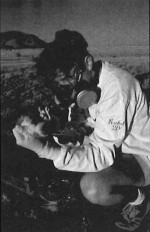The Sevilleta Research Experiences for Undergraduates (REU) site program was recently renewed by NSF for the next three years. Co- investigators Ann Evans and Bob Parmenter will be recruiting students nationwide to work during the summers at the Sevilleta National Wildlife Refuge. The Sevilleta also supports the Undergraduate Mentorship Experiences in Environmental Biology (UMEEB) Program, which is directed at increasing the research expertise of ethnic minority students in the environmental sciences. The program, directed by Bob Parmenter and James Bront, is co-funded by Sandia National Laboratory and NSF.
The Sevilleta REU Site and UMEEB programs both involve ten students each per year in ecological research. The goals of these programs are to:
- Instruct undergraduates in the principles of scientific research
- Expose the students to a wide variety of ecological research techniques and career opportunities
- Facilitate individual student research projects
- Encourage students to continue their scientific education in upper-division courses and graduate school.
To accomplish these goals, the programs include:
- Orientation meetings and a seminar series devoted to the variety of scientific opportunities in ecological research at the Sevilleta
- Faculty-student one-on-one instruction of hypothesis development and research protocols in ongoing Sevilleta LTER projects
- Field and laboratory experiences in sampling and data collectio
- Implementation of individual student research projects, carried out under the guidance of student-selected faculty members
- A summer Sevilleta Symposium for project presentations by the students
- Attendance at scientific meetings (such as this year’s ESA meeting in Snowbird, Utah, at which 12 Sevilleta REU/UMEEB students will be presenting research papers)
- Preparation and submission of project manuscripts to scientific journals
These activities integrate all theoretical and technical aspects of the LTER program and promote a holistic approach to large-scale ecological studies.

 Enlarge this image
Enlarge this image